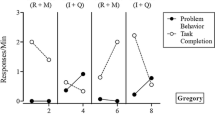Abstract
Token reinforcement procedures are used to increase appropriate behavior (e.g., completion of instructional tasks) and decrease problem behavior (e.g., aggression) in a wide array of clinical contexts. Token exchange-production schedules, which specify the number of tokens that must be accrued to produce the exchange schedule, are important components of token reinforcement programs. For example, accumulated schedules require learners to “bank up” multiple tokens before they can be exchanged, whereas distributed schedules allow learners to exchange tokens for backup reinforcers after just a single token (or a comparatively smaller range of tokens) is earned. Emerging research suggests that individual preferences for these different arrangements varies and is affected by many variables, including increasing work requirements (e.g., reinforcement schedule thinning). In the current study, we demonstrated that preferences for these schedules was stable across increasing work requirements and demonstrated that non-preferred (accumulated) schedule arrangements may support appropriate behavior and decrease problem behavior, even with very lean token-production schedules. These results have implications for practitioners who use token-based interventions and conduct schedule thinning for escape-maintained behavior.


Similar content being viewed by others
References
Andzik, N. R., Smith, E. M., & Neef, N. A. (2020). Using a token economy to treat escape-maintained problem behavior without extinction. Behavior Modification, 0145445520966762. https://doi.org/10.1177/0145445520966762
Argueta, T., Leon, Y., & Brewer, A. (2019). Exchange schedules in token economies: A preliminary investigation of second-order schedule effects. Behavioral Interventions, 34(2), 280–292. https://doi.org/10.1002/bin.1661
Brogan, K. M., Richling, S. M., Rapp, J. T., Thompson, K. R., & Burkhart, B. R. (2018). Collaborative efforts by the Auburn University applied behavior analysis program in the treatment of adolescents adjudicated for illegal sexual behavior. Behavior and Social Issues, 27, AA11-AA15. https://doi.org/10.5210/bsi.v.27i0.8267
Bullock, C. E., Fisher, W. W., & Hagopian, L. P. (2017). Description and validation of a computerized behavioral data program:“BDataPro.” The Behavior Analyst, 40, 275–285. https://doi.org/10.1007/s40614-016-0079-0
DeLeon, I. G., Chase, J. A., Frank‐Crawford, M. A., Carreau‐Webster, A. B., Triggs, M. M., Bullock, C. E., & Jennett, H. K. (2014). Distributed and accumulated reinforcement arrangements: Evaluations of efficacy and preference. Journal of Applied Behavior Analysis, 47(2), 293–313. https://doi.org/10.1002/jaba.116
Falligant, J. M., & Kornman, P. T. (2019). Preferences for accumulated and distributed token exchange-production schedules: A behavior-economic analysis. Behavior Analysis: Research and Practice, 19(4), 373–378. https://doi.org/10.1037/bar0000159
Falligant, J. M., Pence, S. T., & Bedell, S. B. (2020). Preferences for token exchange-production schedules: Effects of task difficulty and token-production schedules. Behavioral Interventions, 35(2), 234–248. https://doi.org/10.1002/bin.1706
Falligant, J. M., Pence, S. T., Sullivan, C., & Luna, O. (2021). Functional analysis and treatment of multiply maintained operant vomiting. Journal of Developmental and Physical Disabilities, 33(1), 153–161.
Fisher, W., Piazza, C. C., Bowman, L. G., Hagopian, L. P., Owens, J. C., & Slevin, I. (1992). A comparison of two approaches for identifying reinforcers for persons with severe and profound disabilities. Journal of Applied Behavior Analysis, 25, 491–498.
Frank-Crawford, M. A., Borrero, J. C., Newcomb, E. T., Chen, T., & Schmidt, J. D. (2019). Preference for and efficacy of accumulated and distributed response–reinforcer arrangements during skill acquisition. Journal of Behavioral Education, 28(2), 227–257. https://doi.org/10.1007/s10864-018-09312-7
Frank-Crawford, M. A., Borrero, J. C., Newcomb, E. T., Doan, T., Fisher, A., & Rooker, G. W. (2021). Accumulated and distributed response–reinforcer arrangements during the treatment of escape-maintained problem behavior. Journal of Applied Behavior Analysis, 54(4), 1566–1585. https://doi.org/10.1002/jaba.870
Fulton, C. J., Tiger, J. H., Meitzen, H. M., & Effertz, H. M. (2020). A comparison of accumulated and distributed reinforcement periods with children exhibiting escape-maintained problem behavior. Journal of Applied Behavior Analysis, 53(2), 782–795. https://doi.org/10.1002/jaba.622
Hackenberg, T. D. (2009). Token reinforcement: A review and analysis. Journal of the Experimental Analysis of Behavior, 91(2), 257–286. https://doi.org/10.1901/jeab.2009.91-257
Hagopian, L. P., Boelter, E. W., & Jarmolowicz, D. P. (2011). Reinforcement schedule thinning following functional communication training: Review and recommendations. Behavior Analysis in Practice, 4(1), 4–16.
Iwata, B. A., Dorsey, M. F., Slifer, K. J., Bauman, K. E., & Richman, G. S. (1994). Toward a functional analysis of self-injury. Journal of Applied Behavior Analysis, 27, 197–209. (Reprinted from Analysis and Intervention in Developmental Disabilities, 2, 3–20, 1982). https://doi.org/10.1901/jaba.1994.27-197
Kim, J. Y., Fienup, D. M., Oh, A. E., & Wang, Y. (2021). Systematic review and meta-analysis of token economy practices in K-5 educational settings, 2000 to 2019. Behavior Modification, 01454455211058077. https://doi.org/10.1177/01454455211058077
Lalli, J. S., Vollmer, T. R., Progar, P. R., Wright, C., Borrero, J., Daniel, D., & May, W. (1999). Competition between positive and negative reinforcement in the treatment of escape behavior. Journal of Applied Behavior Analysis, 32(3), 285–296. https://doi.org/10.1901/jaba.1999.32-285
Robinson, N., & St. Peter, C. C. (2019). Accumulated reinforcers increase academic responding and suppress problem behavior for students with attention-deficit hyperactivity disorder. Journal of Applied Behavior Analysis, 52(4), 1076–1088. https://doi.org/10.1002/jaba.570
Ward-Horner, J. C., Cengher, M., Ross, R. K., & Fienup, D. M. (2017). Arranging response requirements and the distribution of reinforcers: A brief review of preference and performance outcomes. Journal of Applied Behavior Analysis, 50(1), 181–185. https://doi.org/10.1002/jaba.350
Acknowledgements
The authors wish to acknowledge Bo Kim for her assistance with data collection and Nathalie Fernandez for her helpful correspondence during preparation of the manuscript. Molly Bednar is now at Little Leaves Behavioral Services.
Author information
Authors and Affiliations
Corresponding author
Ethics declarations
Ethical Approval
Data for this clinical study and informed consent were obtained in accordance with the ethical standards of the institutional and/or national research committee and with the 1964 Helsinki declaration and its later amendments or comparable ethical standards.
Informed Consent
The data that support the findings of this study are available from the corresponding author upon reasonable request. Informed consent was obtained for the clinical services described in the current study.
Conflict of Interest
All authors declare that they have no conflict of interest.
Additional information
Publisher's Note
Springer Nature remains neutral with regard to jurisdictional claims in published maps and institutional affiliations.
Rights and permissions
About this article
Cite this article
Falligant, J.M., Laureano, B., Chesbrough, E. et al. A Preliminary Analysis of Second-Order Schedule Effects During Treatment of Escape-Maintained Problem Behavior. J Dev Phys Disabil 35, 133–144 (2023). https://doi.org/10.1007/s10882-022-09848-7
Accepted:
Published:
Issue Date:
DOI: https://doi.org/10.1007/s10882-022-09848-7




